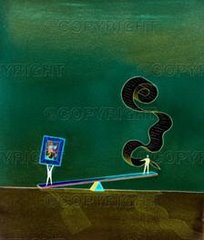Arrested Development was always a brilliant show with a dedicated following. The long-running gags, fourth-wall break-downs, and unforgettable characters make Netflix's decision to bring it back for a final season extremely satisfying for fans.
What is interesting, and somewhat Post-Modern about this final season is that each episode is self-contained, but contains minor references to other episodes - just not like you would find in a television series. This allows one to watch the episodes in the order presented, which gives one set of experiences, including beginnings and endings. Alternatively, one can watch the episodes out of order, following characters and minor plot lines wherever they go. This leads to a different set of beginnings and endings for the viewer.
Happy Viewing in whichever order you choose!
Monday, May 27, 2013
Saturday, May 11, 2013
Pop Culture & The Horrors of Genetic Engineering: Orphan Black and Hemlock Grove
It is commonly accepted among literary scholars that Mary Shelley's Frankenstein
was successful because it played on human fears of the new technology
of electricity. To a certain extent, the exploitation of pop culture
fears has continued apace with technological development ever since.
This includes movies about virtual reality (Lawnmower Man and The Thirteenth Floor), artificial intelligence (Transcendence), and genetic engineering (Species and Species II).
Genetic engineering however has become the most omnipresent in our society of all of these technologies and is involved in everything from our food to attempts to create children with three parents so that gay couples both claim parentage of their offspring. Accordingly, it has become a topic ripe for exploitation in popular culture. Both Orphan Black and Hemlock Grove are excellent exemplars of this, and well made to boot. While they both capitalize on fears of research run amok, Hemlock Grove really takes the mad scientist meme to heart with the mysterious Ouroborous project going on in the lab. Orphan Black takes the other root and capitalizes on Hannah Arendt's banality of evil, showing that one corporation pursuing its own ends can produce horrors.
While neither show is inherently a horror show, they do exploit human fears and apprehension of the potential results of genetic engineering, even if Orphan Black does this in more detail.
Genetic engineering however has become the most omnipresent in our society of all of these technologies and is involved in everything from our food to attempts to create children with three parents so that gay couples both claim parentage of their offspring. Accordingly, it has become a topic ripe for exploitation in popular culture. Both Orphan Black and Hemlock Grove are excellent exemplars of this, and well made to boot. While they both capitalize on fears of research run amok, Hemlock Grove really takes the mad scientist meme to heart with the mysterious Ouroborous project going on in the lab. Orphan Black takes the other root and capitalizes on Hannah Arendt's banality of evil, showing that one corporation pursuing its own ends can produce horrors.
While neither show is inherently a horror show, they do exploit human fears and apprehension of the potential results of genetic engineering, even if Orphan Black does this in more detail.
Subscribe to:
Posts (Atom)

